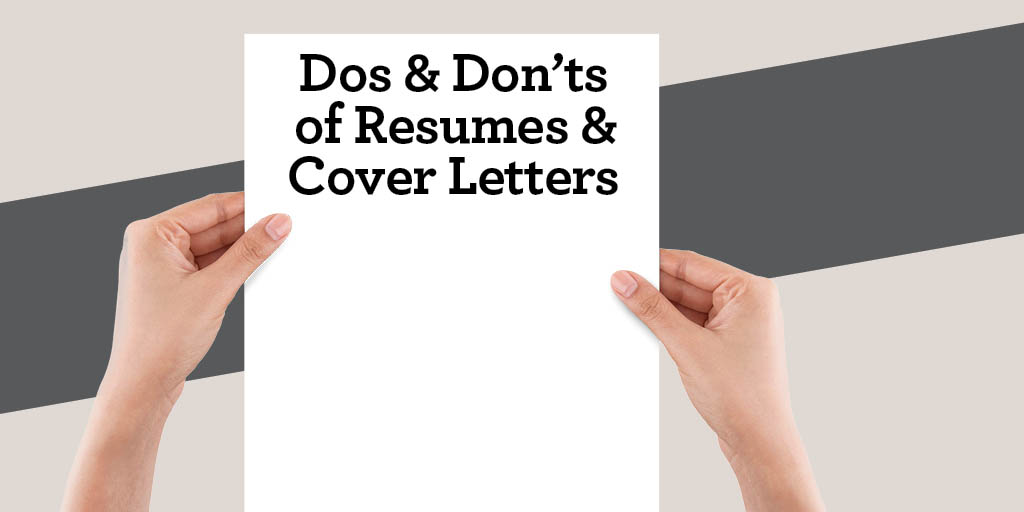Dos and Don'ts of Resumes and Cover Letters

Writing out a cover letter and resume can be stressful knowing that a potential employer will be judging you on what is written on them. How do you make the cover letter and resume look professional? What information do you need to include? What skills will be beneficial to the job? These questions are hard to organize and work out. To help you along with your struggles here is a list of dos and don'ts for resumes and cover letters.
Cover Letter
DO:
✓ Keep the letter to one page. Anymore is unnecessary information to an employer. This letter will also show that you can be clear and concise with your wording.
✓ Use letter layout. You are sending this to someone to read after all. Emphasize transferable skills, which are skills that you have shown in one place, but could use in another, that can be an asset to the job you are applying for.
✓ Describe your skills with action verbs and provide examples on how you demonstrated them. ✓ Relate your connection to the company in the first paragraph. Do you have a personal history with the company's products? Any fond memories from childhood? Pointing out your personal connection will show that you are familiar with what the company does.
✓ Research the company. If you are not already familiar with the company then look into it. You will be able to relate better how your skills match the company's work.
✓ Include some examples on how your background is relevant to the position you are applying for and mention aspects of the job that are related to the examples you give.
✓ Use language, words or expressions, from the company's website or the job ad. This will make you sound like you fit in to the corporate structure of that business.
✓ Make sure to address the letter to a specific person. Write it as “Dear Mr./Ms.” with their last name following after. If you cannot find a specific person to contact use a job title instead such as “Dear Hiring Manager.”
✓ Include the full title of the position of the job you are applying for and where you saw the ad in the introduction paragraph. This will inform the reader right away the position you are applying for.
✓ Ask for an interview in the final paragraph and indicate where the potential employer can contact you. ✓ Apply somewhat formal language, even for companies that give off a “fun” like atmosphere.
✓ Remember to use positive language.
DON'T:
✗ Claim to have qualifications or skills you do not have. You would be falsifying your credentials and are liable to being fired when found out.
✗ Oversell the applicability of unrelated experience. There is no reason to mention experience that will not be useful the work.
✗ Mention your weaknesses. You would only be reflecting yourself as unqualified for the job.
✗ Say anything negative about a past employer or institution.
✗ Come on too strongly. Making yourself sound desperate will not make you sound appealing. Try to sound professional with a bit of enthusiasm tacked on.
Resume
DO:
✓ Keep the resume at one to two pages.
✓ Make sure there are no grammatical errors or typos.
✓ Be consistent with your tenses, formatting or style for the entire resume. Ensure all headers and bullets are all formatted the same.
✓ Use point form structure.
✓ Have font size on the resume that is between 10 to 12 point sizes.
✓ Use a professional email that uses your name. No nickname. You will come off more professional when a potential employer can tell from your email that you are a serious individual.
✓ List your education, qualifications, experience and any other relevant information in a certain order such as by experience or reverse chronological.
✓ Include paid and unpaid experiences. Everything you have done before may possibly have relevance to the position you are applying for.
✓ Provide examples to help highlight and explain your relevant skills, experiences, projects and education.
✓ Emphasize the skills most relevant to the position.
✓ Go into some detail about your education. Explain concise and clearly why the subjects or skills you learned can be an asset to the job. ✓ Explain your transferable skills that can be used in the position you are applying for. Lots of transferable skills can help you in various jobs.
DON'T:
✗ Use personal pronouns like “I”, “me” or “we.”
✗ Write lengthy descriptions. Be brief and clear in your explanations and examples.
✗ Use unnecessary words like “a”, “an” or “the.”
✗ Apply uncommon jargon or abbreviations.
✗ List high school education if you already have one degree/diploma. Do not state “not completed” for any education you are in the progress of completing. Can list it as “in progress” and write about the relevance to the job from the course or program.
✗ List a job if it did not require your social insurance number (SIN). But if the only experience you have is, for example, babysitting then try to frame it as professionally as possible. Instead of “babysitting” try calling it “childcare.”
✗ Say what you did. For example, don't state that “I was a secretary,” but that “I assisted my employer by organizing and planning their schedule for the day.”
✗ Make the resume look busy. Meaning, don't overflow the pages with information to fill every square inch of white space and apply crazy fonts to attract attention. Keep it simple and clean to look professional. �
Resources:
- ryerson.ca/ccetutor/resumes
- lynda.com/Business-Skills-tutorials/ Writing-cover-letter/103702/115581-4.html
- ryerson.ca/career/pdf/CLnewtipsheet.pdf
- ryerson.ca/content/dam/career/pdf/Resumes.pdf
- Resume and Cover Letter Tips Example Format sheet from the Career Services office (D1063)
- “Cover Letters, Resumes, and Interviews” PowerPoint presentation by Stephanie Rahbek Simonsen for Communication for Media (COMM-3075) in Winter 2017)














